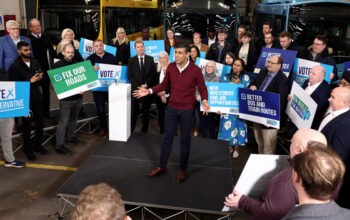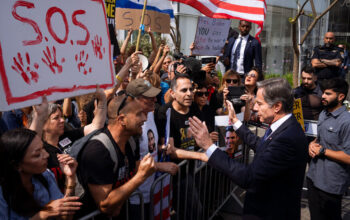
We’re covering a G7 agreement to cap the price of Russian oil and the political struggles of New Zealand’s prime minister.
G7 leaders meet in Germany
At a summit in the mountains of Germany, leaders of the Group of 7 nations embraced an aggressive but untried plan to manipulate the price of oil, the largest commodity market in the world.
The plan — which would put a price cap on Russian oil, but allow it to be sold to the world — is an acknowledgment that Western embargoes have not yet dented Russian oil revenues, while they have driven up gasoline and other fuel prices.
Details still need to be finalized, but American officials said they were confident that the plan could drive down both Russia’s revenues from oil and the price per barrel on global markets.
Over the weekend, the G7 leaders announced plans to invest in infrastructure in less wealthy countries, in part to counter China’s influence. On Monday, China’s government rejected the criticism that its own efforts were “debt traps.”
News from the war in Ukraine:
Russia defaulted on its foreign debt
Russia missed a deadline for making bond payments on Sunday, signaling its first default on international debt in more than a century.
About $100 million in interest payments failed to reach investors within a 30-day grace period following a missed deadline last month. The default was prompted by widespread Western sanctions that sought to seal Moscow off from global capital markets following its invasion of Ukraine.
Russia’s finance ministry disputes the default, saying it had made the payments in May and they had been blocked by a Brussels-based financial clearinghouse. Dmitri S. Peskov, the Kremlin’s spokesman, told reporters that the statements about default were “absolutely illegal.”
Details: A formal declaration of default would need to come from bondholders because ratings agencies, which normally declare when borrowers have defaulted, have been barred by sanctions from reporting on Russia.
What it means: The default will linger in investors’ memories and probably push up Russia’s borrowing costs in the future. However, this default is unusual because it’s a result of sanctions blocking transactions; Moscow’s finances remain resilient after months of war, and Russia continues to receive a steady influx of cash from sales of oil and gas.
New Zealand’s leader loses her shine
Jacinda Ardern, the prime minister of New Zealand, is seen as a star abroad — a young progressive feminist who deftly steered her country through the pandemic and a tragic mass shooting. But at home, her star is fading.
With rising prices for food, fuel and rent, and an explosion of gang violence in New Zealand, Ardern’s center-left Labour Party is polling at its lowest level of support in five years. Many residents are expressing deepening doubts that she can deliver the “transformational” change she promised, as elections loom next year.
“New Zealanders who see this day to day are getting frustrated by a lack of change,” Morgan Godfery, a liberal writer and academic, said. “But if you look from overseas, you don’t see the lack of policy, you see the personality. And that’s where the mismatch comes in.”
Ms. Ardern’s pandemic success helped lift her party to an outright majority in Parliament during the last election, in October 2020. But with most of the virus restrictions lifted, her government has lost its unifying fight against the pandemic and, with it, much of its bipartisan support. What remains is soaring inflation and little progress on issues that have bedeviled New Zealand for decades.
Details: Ms. Ardern’s government announced a payment of 350 New Zealand dollars ($220) to middle- and low-income New Zealanders to help alleviate increases in the cost of living. Many, however, see the government’s responses as inadequate and are dissatisfied by overseas comparisons.
THE LATEST NEWS
Around the World
For seven years, a photographer in India has documented beautifully crafted birdhouses known as chabutras — taking photographs, collecting local narratives and recording people’s memories associated with the structures. Check out some of his favorites, and read the story behind his photographs.
The brands on your screen
Advertising has become easier to avoid, thanks to commercial-free streaming services, skippable YouTube ads and more. Companies and marketers are responding with an increase in product placement.
When done well, a bit of product placement can seem natural; after all, real kitchens are stocked with branded products. But the repeated appearance of certain items can start to look odd. Why is it that so many TV characters are drinking that one blue-capped water? And why do they keep referring to the same real estate app?
Read more about the trend — including examples from your favorite shows.



